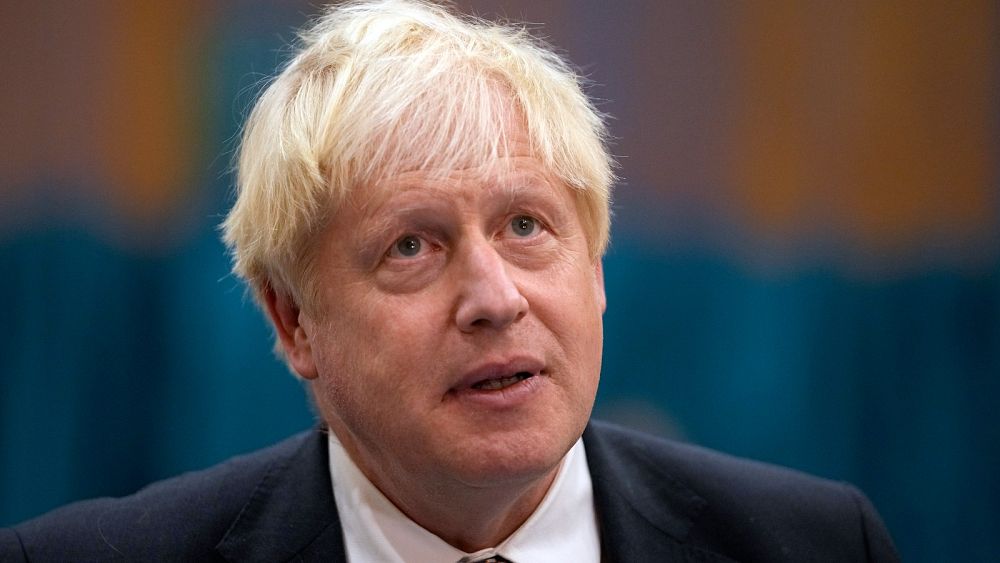
British Prime Minister Boris Johnson flies to a Group of 20 meeting in Rome on Friday with one big goal: to persuade the leaders of the world’s biggest economies to put their money where their mouth is at the U.N. climate summit in Scotland.
Johnson will deploy his ebullience and his — admittedly divisive — charm to try to extract cash and carbon-cutting commitments from the G-20, which contains some of the world’s biggest carbon emitters, including China, the United States, India and Russia.
Accounting for 75% of the world’s trade and 60% of its population, the G-20 has often been accused of being too big and diffuse to take strong collective action. And Johnson’s Brexit-tinged global image means his arm-twisting power may be limited.
The G-20 is meeting as the European Union and ex-member Britain wrangle over trade rules, and amid a simmering U.K.-France spat over fishing rights in the English Channel. France is also incensed over a U.S.-U.K.-Australia nuclear submarine deal that saw Australia cancel a multibillion-dollar contract to buy French subs.
Those disputes are clouding Johnson’s hopes of a “G-20 bounce” to build momentum for the 12-day COP26 climate conference, which starts Sunday in Glasgow. He’s hoping to leave Rome bearing a sheaf of global carbon-cutting pledges, a plan to curb coal use and a long-promised, never-delivered $100 billion a year in aid to help developing countries tackle the impacts of climate change.
“The biggest issue is ratcheting up ambition,” said Jared Finnegan, a public policy expert at University College London. “Boris (Johnson) has been talking for some time about how he expects the largest economies, the G-20, to come forward with more ambitious pledges than what countries put forward in 2015” when the landmark Paris climate agreement was struck.
“Some countries have come forward with that and played ball, other countries have not,” Finnegan added.
Major G-20 polluters, including Russia and Australia, have failed to improve on the carbon-cutting pledges made after the Paris conference. Neither Chinese President Xi Jinping nor Russian President Vladimir Putin, leaders of two of the biggest carbon emitters, plan to attend the G-20 or COP26 in person.
The world is currently far adrift of the goal set in Paris of limiting global warming to 1.5 degrees Celsius above pre-industrial levels, considered a threshold between manageable and disastrous climate change. Keeping “1.5 alive” is the focus of the Glasgow meeting. To do it, Britain has honed in on a mantra of “coal, cars, cash and trees” — eliminating fossil fuels, switching to clean vehicles, spending money and stopping deforestation.
Johnson said this week it was “touch and go” whether the climate summit would meet its goals.
“We might not get the agreements that we need,” Johnson said during a question-and-answer session with children.
That may be a prudent lowering of expectations, but Johnson faces some big obstacles. Britain’s leader is mistrusted by many European leaders for his role in Britain’s 2016 decision to leave the EU and the years of rancorous divorce negotiations that have followed. U.S. President Joe Biden has also been wary, seeing echoes in Johnson’s crowd-pleasing antics of Donald Trump’s populism.
Johnson insists that Brexit does not mean a U.K. retreat from the world, and has championed his vision of an outward-looking “Global Britain” during the country’s presidency of the Group of Seven wealthy industrialized nations this year. A G-7 summit in England in June was considered a modest success by Britain, even though environmental groups said its climate commitments lacked substance.
Johnson makes a more credible green messenger than some rich nations’ leaders. The U.K. has promised to reach net-zero carbon emissions by 2050, and has published a detailed plan for getting there. Unlike Australia, it is on course to eliminate coal from its energy mix within a few years. And unlike the United States, there’s limited political opposition in the U.K. to tougher climate rules.
But the British government’s decision this year to cut foreign aid spending from 0.7% of GDP to 0.5% because of the economic blow from the coronavirus pandemic alarmed aid groups and undercut the U.K.’s commitment to developing nations. The British government said this week that cut will remain at least until 2024.
The U.K.’s annual budget, announced Wednesday, made scant mention of climate change while slashing passenger taxes on domestic flights and freezing taxes on automobile fuel.
Johnson’s spokesman, Max Blain, denied those measures undermined Britain’s environmental image or net-zero target.
“I think anyone that’s been tracking our commitments on climate change and net-zero can see that the United Kingdom is leading the way on this,” he said.
Pessimists might wonder — if G-20 can’t agree on how to fight climate change, what hope is there for the almost 200 nations who will gather at COP26 in Glasgow?
Yet Finnegan sees progress in the fact that a Conservative British government wants to be seen as a green leader, and in the way the global conversation on climate has shifted.
“Even the fact that we’re talking about net-zero by 2050 — that is something that just wasn’t on the table even five years ago,” he said.
